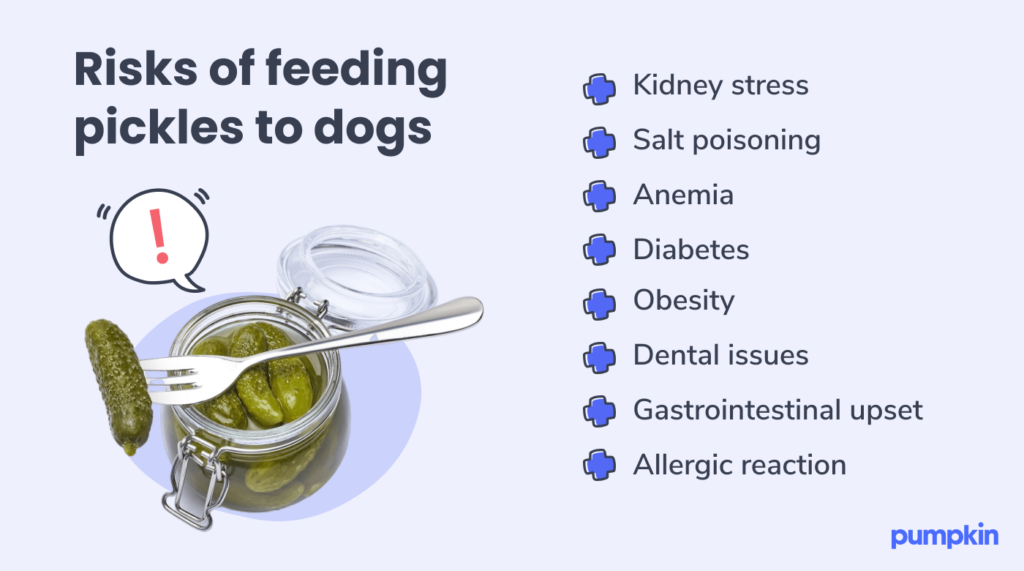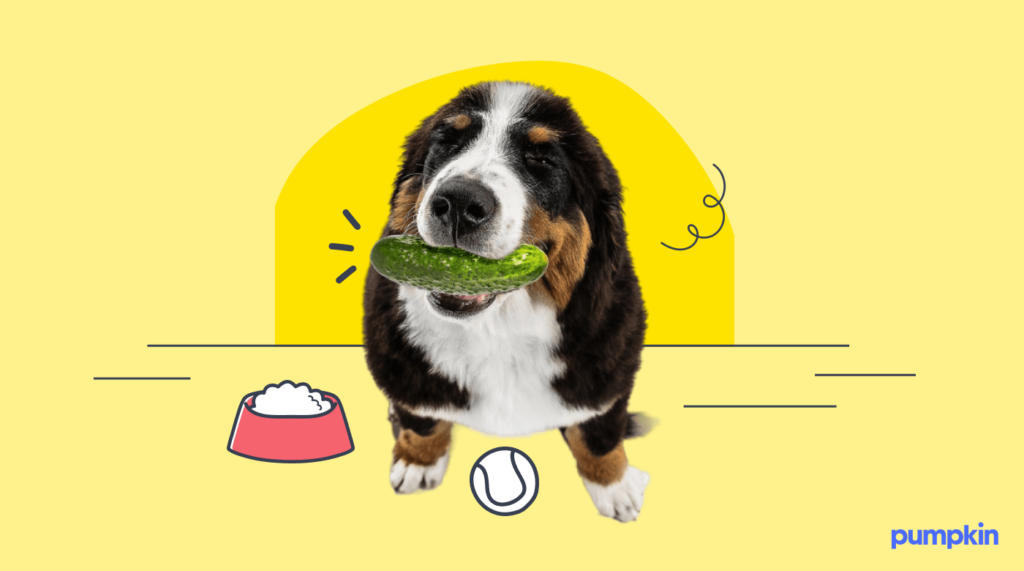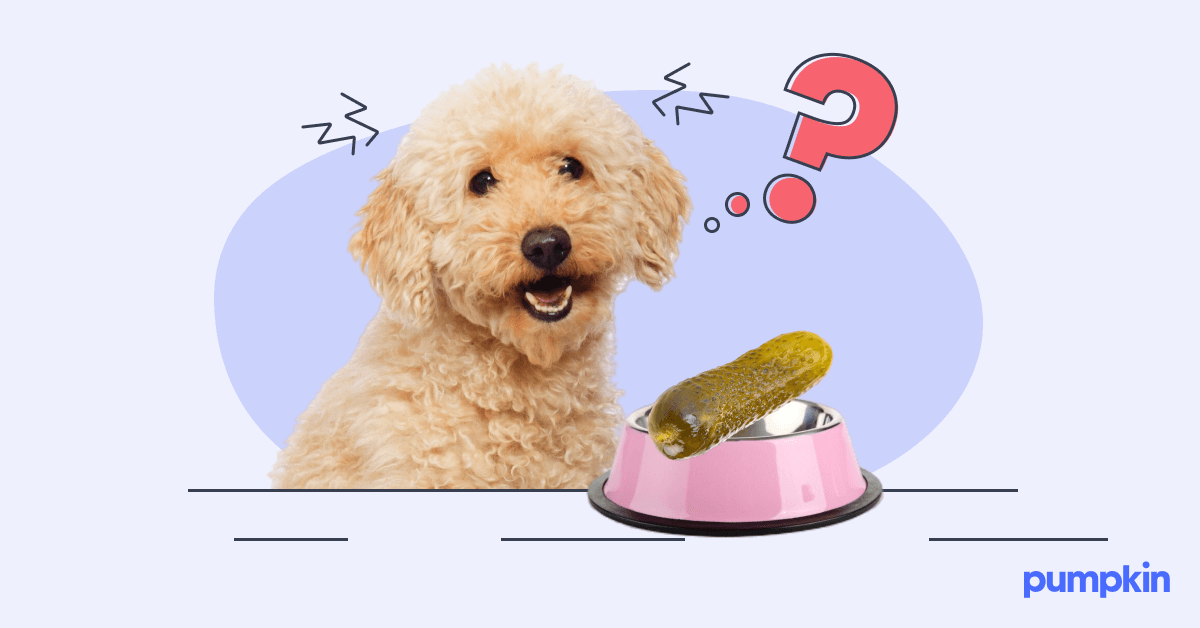Key Points
- Pickles aren’t safe for dogs to eat because of pickling ingredients like vinegar, onion, garlic, sugar, and salt.
- Accidental ingestion is no cause for alarm, but monitor your pup’s reaction.
- Looking for alternatives to pickle? Cucumbers are a crunchy, dog-safe snack.
Can dogs eat pickles? In truth, no pickles are safe for dogs to eat, and that means your dog’s diet should be 100% pickle-free. Whether classic, sweet, or dill, pickles contain many harmful ingredients — vinegar, onions, sugar, and garlic — that can upset digestion, decay teeth, cause weight gain, exacerbate heart or kidney disease, and even trigger anemia.
At a basic level, pickles are considered non-toxic to dogs, so there isn’t an immediate cause for concern if your pup accidentally ingests one. But if you’re exploring human foods to add to your pup’s diet, you can skip the pickles.
In this guide, you’ll learn about the risks of feeding your pup pickles and the best alternative snacks to benefit your dog’s health.
Pickle risks outweigh pickle rewards
Dogs gain little-to-no nutritional value from pickles, and eating them can actually harm their health.
Pickles start off as cucumbers, which happen to be very healthy for dogs. The pickling process preserves a food product using either salt or vinegar, and it’s a common practice in culinary traditions around the world. Besides cucumbers, many fruits, vegetables, and meats can be pickled, and you should avoid feeding these foods to your pooch as well.
Pickled food can pose a few risks for dogs, depending on what the brine contains. For example:
- The high amount of salt in the brine can lead to sodium toxicity in dogs.
- Some types of pickles are sweetened with sugar, which can cause obesity and dental issues.
- Sugar-free pickles may contain xylitol, which is very toxic for dogs and could cause liver failure, even in small amounts.
With more risks than benefits, pickles are a human food that should be avoided when treating your pup to a snack.
Risks of feeding pickles to dogs
Let’s break down the risks your pup faces if they eat pickles in a little more detail. Fortunately, a few bites of a pickle scooped up off the floor likely won’t poison your pup, but larger amounts can be dangerous.

Kidney stress
Distilled white vinegar has no nutritional value for your dog. It can stress their kidneys and cause stomach upset and diarrhea.
Sodium poisoning
Most pickling recipes contain an abundance of salt as a natural preservative. A medium-size pickle can contain as much as 700 to 800 milligrams of sodium.
The salt in commercial dog food is carefully measured to keep pets’ sodium levels at a healthy level. The high salt content of pickles can throw off this balance and potentially cause salt toxicity.
Salt toxicity is a serious concern associated with canine pickle consumption. Symptoms of salt toxicity may include:
- Dehydration
- Stiffness
- Difficulty walking
- Incoordination
- Tremors
- Seizures
- High blood pressure
High blood pressure increases stress on the heart, so dogs with heart disease should especially steer clear. Dogs with Addison’s disease and kidney disease may also be prone to salt poisoning due to an inability to regulate fluids and electrolytes.
Anemia
Onions and garlic are also common pickling ingredients. They come from the allium family of root vegetables, which includes leeks, scallions, and chives. These vegetables contain N-propyl disulfide, an organic compound that can damage your dog’s red blood cells and cause hemolytic anemia.
Signs of anemia in dogs include extreme fatigue, loss of appetite, and pale gums. It’s a serious condition that requires immediate veterinary care.
Diabetes, obesity, and dental issues
Sweet pickles and bread-and-butter pickles contain a lot of sugar. A 1/2 cup of bread and butter pickle slices contains 14 grams of sugar.
Eating human foods that are high in sugar can cause weight gain, obesity, and diabetes in dogs. Eating too much sugar can also cause tooth decay and periodontal disease, which can leave your pup with all kinds of health problems (not to mention room-clearing doggy breath).
Dogs with diabetes, kidney disease, or weight problems should avoid eating sweetened foods.
Gastrointestinal upset
Cloves and other common pickling spices in sweet pickles are safe for your dog if they gobble up a dropped slice.
However, some brine recipes include cinnamon and nutmeg, which contain myristicin. Myristicin is toxic if consumed in large quantities. More often than not, the small amount found in pickle spices won’t cause toxicity, but it could cause an upset stomach.
Allergic reaction
Pickle allergies in dogs won’t come from the pickle itself but from the additives used during the pickling process. For example, a pickle could trigger symptoms in a dog with a vinegar allergy.
If your dog has eaten a new food like pickles, watch them for allergy symptoms such as:
- Upset stomach
- Hives
- Diarrhea
- Itching
- Difficulty breathing
- Dizziness
- Swelling
If any of these symptoms are present, call your vet.
What to do if your dog eats pickles
If your dog accidentally ingests pickles, you may be tempted to make them vomit it up. However, making your dog vomit may do more harm than good. Inducing vomiting can cause aspiration pneumonia, especially in small breeds like French Bulldogs or Pekingese. Besides, a few pickle slices (or even a whole pickle spear) probably won’t harm your pup.
Instead, call your veterinarian or the ASPCA Animal Poison Control Center hotline (1-888-426-4435) if your dog ate pickles and displays signs of toxicity like lethargy, vomiting, diarrhea, or seizures.
How to prepare pickles for dogs
Step one: Invent a time machine. Step two: Go back and stop the cucumber from being pickled and feed it to your dog fresh instead.
Remember: There’s no safe way to prepare pickles for your dog. In contrast to pickles, fresh cucumbers offer many health benefits.
Pickle alternatives for dogs
There are many other human foods your pet can eat, like raw cucumber, celery, or strawberries. These satisfying alternatives offer health benefits without posing potential risks to your dog’s well-being.
You should always wash fruits and veggies and cut them into bite-sized pieces. And even though they have health benefits, you should share them in moderation. This is especially important for small dogs. Vets commonly recommend that treats, including raw veggies, make up no more than 10% of your dog’s diet. So, which fruits and veggies can your dog enjoy safely?
Cucumbers are low-calorie, low-sugar, high-fiber veggies that even overweight and diabetic dogs can enjoy. Cucumbers can be sliced, cubed, or dehydrated for a chewier texture.
Raw cucumber contains vitamin A, vitamin K, and vitamin C, as well as minerals like magnesium, manganese, calcium, potassium, and phosphorus. They also provide a healthy dose of antioxidants. Lastly, because they’re full of water, they’re also a hydrating snack.

Celery contains mostly water and is packed with nutrients like vitamin A, vitamin C, and vitamin K, plus critical minerals like calcium, magnesium, potassium, and folate.
Broccoli is packed with fiber and essential vitamins and nutrients. It’s also known for its anti-inflammatory properties.
Green beans contain fiber, protein, and iron, and are also a source of vitamin C and vitamin K. They’re a low-calorie treat that’s safe for overweight or obese dogs.
Carrots are loaded with fiber and contain beta-carotene which contributes to healthy vision, skin, and coat.
Bell peppers contain healthy nutrients like vitamins A and C. Green, red, yellow, and orange bell peppers are all safe for dogs.
Blueberries are packed with the highest amount of antioxidants of all fruits and contain essential vitamins that help reduce inflammation, promote immune health, and support healthy muscles and nerves.
The verdict: Dogs shouldn’t eat pickles
If pickles are your favorite food, it can be heartbreaking to see those sad puppy dog eyes watching you as you chow down. While dogs can sample a lot of what you eat in small amounts, when it comes to pickles, the risks outweigh the benefits.
Fortunately, plenty of other fruits and vegetables are safe, delicious, and nutritious for dogs. As with anything, it’s always a good idea to consult your veterinarian before giving your dog a new food — and to introduce that food slowly to ensure it’s well-tolerated.
Having a pet insurance plan can give you peace of mind when life’s little accidents happen. Learn more about how a Pumpkin Pet Insurance plan can help cover eligible vet bills for future accidents and illnesses, giving pet parents one less thing to worry about
FAQs
- https://www.scielo.br/j/jvatitd/a/HB5wqsgNcbhcg8cGm3hy95j/?format=pdf&lang=en
- https://vetmeds.org/pet-poison-control-list/salt/#!form/PPCDonations
- https://vcahospitals.com/know-your-pet/anemia-in-dogs
- https://www.petpoisonhelpline.com/pet-safety-tips/nutmeg-cinnamon-toxicity/
- https://www.aspca.org/pet-care/animal-poison-control
- https://www.healthline.com/nutrition/foods/carrots#vitamins-minerals
- https://www.stjohns.health/documents/content/top-20-foods-high-in-antioxidants.pdf
- https://animalwellnessmagazine.com/dill-dogs/
- https://fdc.nal.usda.gov/fdc-app.html#/food-details/169378/nutrients
- https://fdc.nal.usda.gov/fdc-app.html#/food-details/169379/nutrients
- https://www.ncbi.nlm.nih.gov/pmc/articles/PMC6868456/




